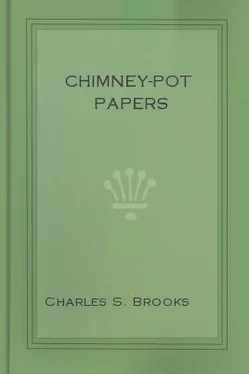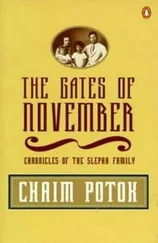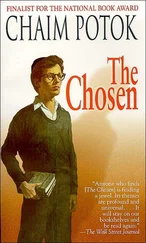Charles Brooks - Chimney-Pot Papers
Здесь есть возможность читать онлайн «Charles Brooks - Chimney-Pot Papers» весь текст электронной книги совершенно бесплатно (целиком полную версию без сокращений). В некоторых случаях можно слушать аудио, скачать через торрент в формате fb2 и присутствует краткое содержание. Город: London, Год выпуска: 1920, Издательство: New Haven: Yale University Press, Жанр: Юмористическая проза, на английском языке. Описание произведения, (предисловие) а так же отзывы посетителей доступны на портале библиотеки ЛибКат.
- Название:Chimney-Pot Papers
- Автор:
- Издательство:New Haven: Yale University Press
- Жанр:
- Год:1920
- Город:London
- ISBN:нет данных
- Рейтинг книги:4 / 5. Голосов: 1
-
Избранное:Добавить в избранное
- Отзывы:
-
Ваша оценка:
- 80
- 1
- 2
- 3
- 4
- 5
Chimney-Pot Papers: краткое содержание, описание и аннотация
Предлагаем к чтению аннотацию, описание, краткое содержание или предисловие (зависит от того, что написал сам автор книги «Chimney-Pot Papers»). Если вы не нашли необходимую информацию о книге — напишите в комментариях, мы постараемся отыскать её.
Chimney-Pot Papers — читать онлайн бесплатно полную книгу (весь текст) целиком
Ниже представлен текст книги, разбитый по страницам. Система сохранения места последней прочитанной страницы, позволяет с удобством читать онлайн бесплатно книгу «Chimney-Pot Papers», без необходимости каждый раз заново искать на чём Вы остановились. Поставьте закладку, и сможете в любой момент перейти на страницу, на которой закончили чтение.
Интервал:
Закладка:
But for the liveliest truancy, keep an eye out for red-haired and freckled lads, and make them your counselors! Lads so spotted and colored, I have found, are of unusual enterprise in knowing the best woodland paths and the loftiest views. A yellow-haired boy, being of paler wit, will suck his thumb upon a question. A touzled black exhibits a sulky absorption in his work. an indifferent brown, at best, runs for an answer to the kitchen. But red-haired and freckled lads are alive at once. Whether or not their roving spirit, which is the basis of their deeper and quicker knowledge, proceeds from the magic of the pigment, the fact yet remains that such boys are surer than a signpost to direct one to adventure. This truth is so general that I have read the lives of the voyagers—Robinson Crusoe, Captain Kidd and the worthies out of Hakluyt—if perhaps a hint might drop that they too in their younger days were freckled and red-haired. Sir Walter Raleigh—I choose at random—was doubtless called "Carrots" by his playmates. But on making inquiry of a red-haired lad, one must have a clear head in the tumult of his direction. I was once lost for several hours on the side of Anthony's Nose above the Hudson because I jumbled such advice. And although I made the acquaintance of a hermit who dwelt on the mountain with a dog and a scarecrow for his garden—a fellow so like him in garment and in feature that he seemed his younger and cleaner brother—still I did not find the top or see the clear sweep of the Hudson as was promised.
If it is your habit to inquire of distance upon the road, do not quarrel with conflicting opinion! Judge the answer by the source! Persons of stalwart limb commonly underestimate a distance, whereas those of broken wind and stride stretch it greater than it is. but it is best to take all answers lightly. I have heard of a man who spent his rainy evenings on a walking trip in going among the soda clerks and small merchants of the village, not for information, but to contrast their ignorance. Aladdin's wicked uncle, when he inquired direction to the mountain of the genii's cave, could not have been so misdirected. Shoemakers, candy-men and peddlers of tinware—if such modest merchants existed also on the curb in those magic days—must have been of nicer knowledge or old Kazrac would never have found the lamp. In my friend's case, on inquiry, a certain hotel at which we aimed was both good and bad, open and shut, burned and unburned.
There is a legend of the Catholic Church about a certain holy chapel that once leaped across the Alps. It seems gross superstition, yet although I belong to a protesting church, I assert its likelihood. For I solemnly affirm that on a hot afternoon I chased a whole village that skipped quite as miraculously before me across the country. It was a village of stout leg and wind and, as often as I inquired, it still kept seven miles ahead. Once only I gained, by trotting on a descent. Not until night when the village lay down to rest beside a quiet river did I finally overtake it. And the next morning I arose early in order to be off first upon my travels, and so keep the lively rascal in the rear.
In my country walks I usually carry a book in the pocket opposite to my lunch. I seldom read it, but it is a comfort to have it handy. I am told that at one of the colleges, students of smaller application, in order that they may truthfully answer as to the length of time they have spent upon their books, do therefore literally sit upon a pile of them, as on a stool, while they engage in pleasanter and more secular reading. I do not examine this story closely, which rises, doubtless, from the jealousy of a rival college. Rather, I think that these students perch upon the books which presently they must read, on a wise instinct that this preliminary contact starts their knowledge. And therefore a favorite volume, even if unopened in the pocket, does nevertheless by its proximity color and enhance the enjoyment of the day. I have carried Howell, who wrote the "Familiar Letters," unread along the countryside. A small volume of Boswell has grown dingy in my pocket. I have gone about with a copy of Addison with long S's, but I read it chiefly at home when my feet are on the fender.
I had by me once as I crossed the Devon moors a volume of "Richard Feverel." For fifteen miles I had struck across the upland where there is scarcely a house in sight—nothing but grazing sheep and wild ponies that ran at my approach. Sometimes a marshy stream flowed down a shallow valley, with a curl of smoke from a house that stood in the hollow. At the edge of this moorland, I came into a shady valley that proceeded to the ocean. My feet were pinched and tired when I heard the sound of water below the road. I pushed aside the bushes and saw a stream trickling on the rocks. I thrust my head into a pool until the water ran into my ears, and then sat with my bare feet upon the cool stones where the runnel lapped them, and read "Richard Feverel." To this day, at the mention of the title, I can hear the pleasant brawl of water and the stirring of the branches in the wind that wandered down the valley.
Hazlitt tells us in a famous passage with what relish he once read "The New Eloise" on a walking trip. "It was on the 10th of April, 1798," he writes, "that I sat down to a volume of the New Eloise, at the inn at Llangollen, over a bottle of sherry and a cold chicken." I am quite unfamiliar with the book, yet as often as I read the essay—which is the best of Hazlitt—I have been teased to buy it. Perhaps this springs in part from my own recollection of Llangollen, where I once stopped on a walking trip through Wales. The town lies on the river Dee at the foot of fertile hills patched with fences, on whose top there stand the ruins of Dinas Bran, a fortress of forgotten history, although it looks grimly towards the English marches as if its enemies came thence. Thrown across the river there is a peaked bridge of gray stone, many centuries old, on which the village folk gather at the end of day. I dined on ale and mutton of such excellence that, for myself, a cold volume of the census—if i had fallen so low—must have remained agreeably in memory. I recall that a street-organ stopped beneath the window and played a merry tune—or perhaps the wicked ale was mounting—and I paused in my onslaught against the mutton to toss the musician a coin.
I applaud those who, on a walking trip, arise and begin their journey in the dawn, but although I am eager at night to make an early start, yet I blink and growl when the morning comes. I marvel at the poet who was abroad so early that he was able to write of the fresh twilight on the world—"Where the sandalled Dawn like a Greek god takes the hurdles of the hills"—but for my own part I would have slept and missed the sight. But an early hour is best, despite us lazybones, and to be on the road before the dew is gone and while yet a mist arises from the hollows is to know the journey's finest pleasure.
Persons of early hours assert that they feel a fine exaltation. I am myself inclined to think, however, that this is not so much an exaltation that arises from the beauty of the hour, as from a feeling of superiority over their sleeping and inferior comrades. It is akin to the displeasing vanity of those persons who walk upon a boat with easy stomach while their companions lie below. I would discourage, therefore, persons that lean toward conceit from putting a foot out of bed until the second call. On the other hand, those who are of a self-depreciative nature should get up with the worm and bird. a man of my own acquaintance who was sunk in self-abasement for many years, was roused to a salutary conceit by no other tonic.
And it is certain that to be off upon a journey with a rucksack strapped upon you at an hour when the butcher boy takes down his shutters is a high pleasure. Off you go through the village with swinging arms. Off you go across the country. A farmer is up before you and you hear his reaper across the field, and the neighing of his horses at the turn. Where the hill falls sharp against the sky, there he stands outlined, to wipe the sweat. And as your nature is, swift or sluggish thoughts go through your brain—plots and vagrant fancies, which later your pencil will not catch. It is in these earliest hours while the dew still glistens that little lyric sentences leap into your mind. Then, if at all, are windmills giants.
Читать дальшеИнтервал:
Закладка:
Похожие книги на «Chimney-Pot Papers»
Представляем Вашему вниманию похожие книги на «Chimney-Pot Papers» списком для выбора. Мы отобрали схожую по названию и смыслу литературу в надежде предоставить читателям больше вариантов отыскать новые, интересные, ещё непрочитанные произведения.
Обсуждение, отзывы о книге «Chimney-Pot Papers» и просто собственные мнения читателей. Оставьте ваши комментарии, напишите, что Вы думаете о произведении, его смысле или главных героях. Укажите что конкретно понравилось, а что нет, и почему Вы так считаете.











